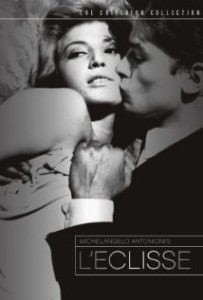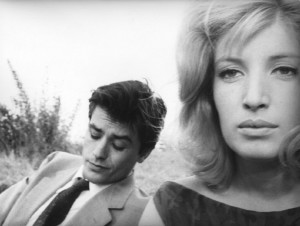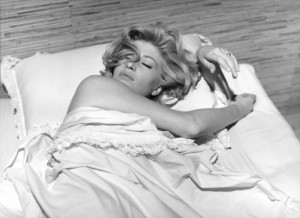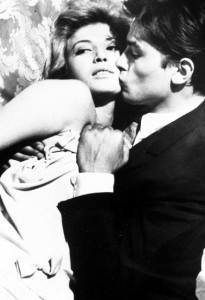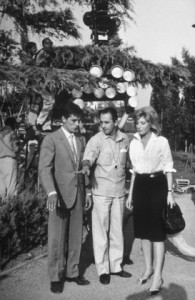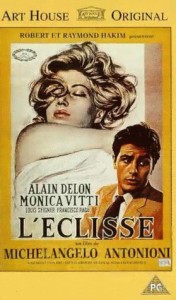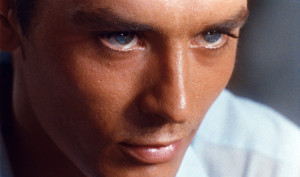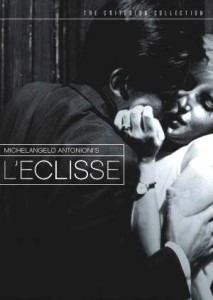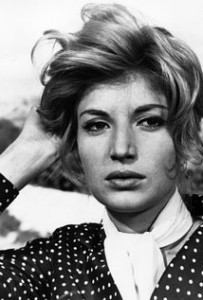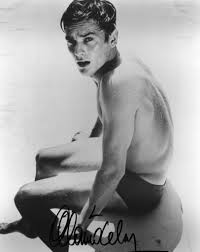L’Eclisse [The Eclipse] ***** (1962, Monica Vitti, Alain Delon, Francisco Rabal) – Classic Movie Review 2,850
Michelangelo Antonioni’s electrifying 1962 world cinema classic stars beguiling Monica Vitti as a translator in Rome, who leaves her older lover (Francisco Rabal) and starts a new relationship with a young stockbroker (Alain Delon).
Director Michelangelo Antonioni’s electrifying 1962 world cinema classic art movie stars beguiling Monica Vitti as Vittoria, a translator in Rome, who leaves her older lover Riccardo (Francisco Rabal) and starts up a new relationship with confident and ambitious young stockbroker Piero (Alain Delon).
Antonioni’s slim storyline is merely a situation, in which he seems to be setting out to redefine what can be done in narrative cinema. But he turns the narrative into developing an extremely fine mood piece and character study, analysing Rome and its inhabitants as a place of estrangement and alienation where people are disconnected and lost. Despite the possible pitfalls, it never feels extended or gloomy, only haunting, gripping and mesmerising for all its 126-minute length, and it’s utterly riveting the entire way for those who allow themselves to get into it.
It’s incredible that Antonioni can make a rotating electric fan at dawn into a major character in the initial break-up drama, and later extend the scenes of over-excited chaos as the Rome Borsa Stock Exchange way beyond any reasonable length to make them vibrant and stunning. It’s incredible that he makes screaming speculators, sad victims, a street drunk, his corpse in Delon’s car being dragged out of the river, a lit street lamp at dusk and a couple necking on the sofa into drama. But he does.
An odd, uncomfortable interlude with a neighbour brought up in Kenya implies a critique of Italian – and world – colonialism, though this of course proves as elusive to pin down and categorise as the rest of the film. Antonioni is too clever and subtle to make any direct statements, messages as for Western Union, though he does make them anyway.
Nobody does alienation as well as the commanding Antonioni, and the haunting, seductive Vitti is the perfect vehicle for him, while the elegant young Delon is just compelling. The film captures both of them at their most confident and alluring. Sometimes looking like they are posing like modish models beautifully framed in eye-catching compositions, they nevertheless manage to inhabit their characters, make them seem ‘real’, unique and strangely sympathetic.
Rome’s architecture old and new provides the backdrop, sometimes the foreground, for the couple’s doomed affair. Against this stylish veneer, the actors play out Antonioni’s theme of the difficulty of forging meaningful and lasting relationships in the Sixties modern world, overlit, concrete and apparently meaningless.
Cinematographer Gianni De Venanzo films urban scenes of strange beauty in astounding images in startling black and white. The stunning 2015 digital restoration shows in its stark glory.
Winner of the Special Jury Prize at the Cannes Film Festival in 1962, it is the third film in Antonioni’s trilogy on Sixties modern malaise, after L’Avventura (1960) and La Notte (1961).
I guess it goes without saying that they sure don’t make films like this any more. But we don’t need them. We’ve got this one, back current again thanks to the Studio Canal restoration.
Alain Fabien Maurice Marcel Delon (8 November 1935 – 18 August 2024) died peacefully at his home in Douchy, France, surrounded by family members, aged 88.
© Derek Winnert 2015 Classic Movie Review 2,850
Check out more reviews on http://derekwinnert.com

